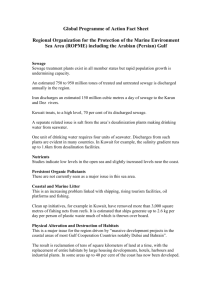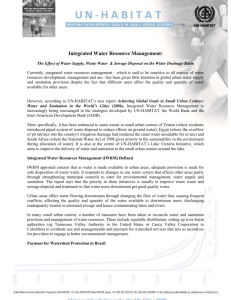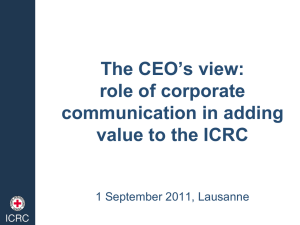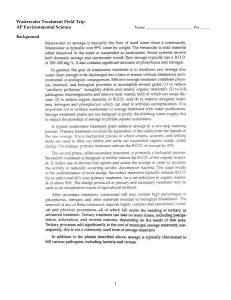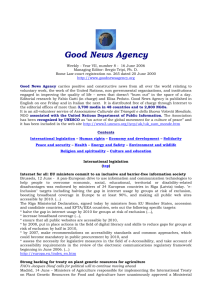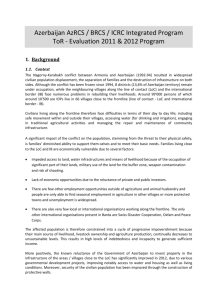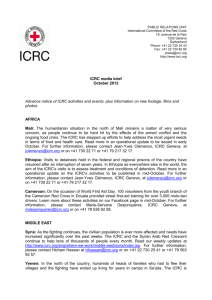E9_HO_Urban Emergency Sanitation
advertisement
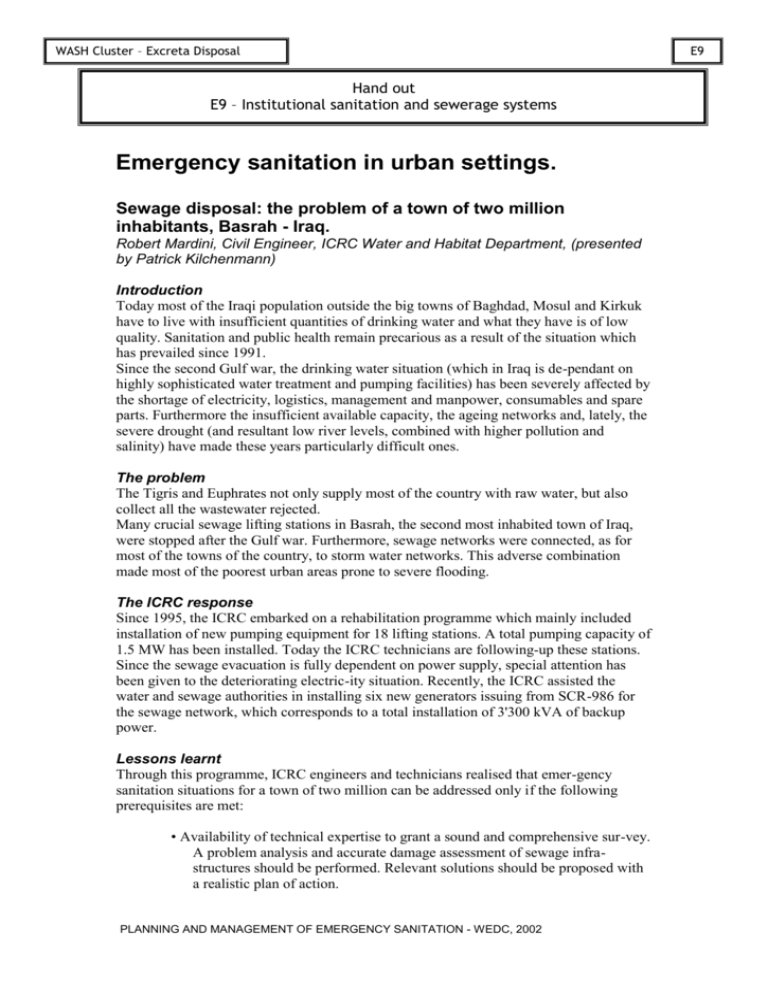
WASH Cluster – Excreta Disposal Hand out E9 – Institutional sanitation and sewerage systems Emergency sanitation in urban settings. Sewage disposal: the problem of a town of two million inhabitants, Basrah - Iraq. Robert Mardini, Civil Engineer, ICRC Water and Habitat Department, (presented by Patrick Kilchenmann) Introduction Today most of the Iraqi population outside the big towns of Baghdad, Mosul and Kirkuk have to live with insufficient quantities of drinking water and what they have is of low quality. Sanitation and public health remain precarious as a result of the situation which has prevailed since 1991. Since the second Gulf war, the drinking water situation (which in Iraq is de-pendant on highly sophisticated water treatment and pumping facilities) has been severely affected by the shortage of electricity, logistics, management and manpower, consumables and spare parts. Furthermore the insufficient available capacity, the ageing networks and, lately, the severe drought (and resultant low river levels, combined with higher pollution and salinity) have made these years particularly difficult ones. The problem The Tigris and Euphrates not only supply most of the country with raw water, but also collect all the wastewater rejected. Many crucial sewage lifting stations in Basrah, the second most inhabited town of Iraq, were stopped after the Gulf war. Furthermore, sewage networks were connected, as for most of the towns of the country, to storm water networks. This adverse combination made most of the poorest urban areas prone to severe flooding. The ICRC response Since 1995, the ICRC embarked on a rehabilitation programme which mainly included installation of new pumping equipment for 18 lifting stations. A total pumping capacity of 1.5 MW has been installed. Today the ICRC technicians are following-up these stations. Since the sewage evacuation is fully dependent on power supply, special attention has been given to the deteriorating electric-ity situation. Recently, the ICRC assisted the water and sewage authorities in installing six new generators issuing from SCR-986 for the sewage network, which corresponds to a total installation of 3'300 kVA of backup power. Lessons learnt Through this programme, ICRC engineers and technicians realised that emer-gency sanitation situations for a town of two million can be addressed only if the following prerequisites are met: • Availability of technical expertise to grant a sound and comprehensive sur-vey. A problem analysis and accurate damage assessment of sewage infrastructures should be performed. Relevant solutions should be proposed with a realistic plan of action. PLANNING AND MANAGEMENT OF EMERGENCY SANITATION - WEDC, 2002 E9 WASH Cluster – Excreta Disposal Hand out E9 – Institutional sanitation and sewerage systems • Good relations with the water and sewage authorities are built in order to establish the right priorities. • Appropriate safety measures are deployed to ensure perfect working conditions in situ: avoid sewage gases through good ventilation and develop measures to protect workers. • Availability of qualified HR to implement the rehabilitation programme: technicians, welders, mechanics, and electricians. Project managers should continuously follow-up the implementation to ensure that all safety measures are respected. • Availability of funds and efficient logistics are in place: most of the time, costly and heavy equipment must be purchased from abroad. Conclusions Nowadays, most of the Water and Sewage treatment services in Iraq are in a very poor condition. Not only has the productivity been severely reduced, but also the available capacity is more and more unpredictable. The fact that a ser-vice is available today does not mean that it will available be tomorrow. Imbal-ance between input and deterioration continue to persist. In this situation the best the ICRC and other humanitarian agencies working in the water and sani-tation field can do is to stabilise the degradation. Although specific interventions can positively affect the water and sewage ser-vices, or avoid a disaster as seen in Basrah, one should be aware that it is very difficult to substitute for the economy of what was one of the richest oil-producing countries in the world until 1990. It is important to stress that the ICRC's programme is only dealing with the tip of the iceberg. All it can do is prop up a system which really needs costly reha-bilitation, proper maintenance and long-term investment. It would be impossible to assess the social benefits of the ICRC's Water and Sanitation achievements in Iraq. However, we believe that some risks endan-gering public health have been significantly reduced, in specific locations such as Basrah town, where evacuation of wastewater has been notably improved through the refurbishment of a number of key sewage pumping stations. The work that the ICRC has been doing over the past six years, to alleviate the most problematic deficiencies in the Water and Sanitation field, has to continue on a larger scale, involving co-ordination with all the inter linked sectors. Treglown, S., Harvey, P., and Reed, R. (2002) Planning and Management of Emergency Sanitation: Proceedings of an International Conference, WEDC, Loughborough University, UK, 10th-12th April 2002. WEDC, Loughborough University, UK. PLANNING AND MANAGEMENT OF EMERGENCY SANITATION - WEDC, 2002 E9
